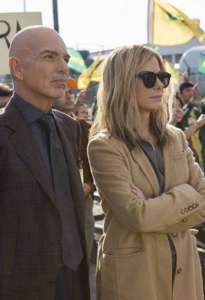
Sandra Bullock plays “Calamity” Jane Bodine in “Our Brand is Crisis.”
★★★★☆
From director David Gordon Green comes “Our Brand is Crisis,” a comedy-drama about the 2002 Bolivian presidential elections. Set to be released Oct. 30, the film stars Sandra Bullock as “Calamity” Jane Bodine, an American political consultant called out of log cabin isolation to assist a Bolivian congressman in his presidential bid. The film’s star-studded cast features Billy Bob Thornton as opposition consultant Pat Candy and Joaquim de Almeida as Congressman Castillo.
Loosely adapted from a 2005 documentary of the same name, “Our Brand Is Crisis” takes many liberties with its historical interpretation of the elections. For instance, Bullock’s character was initially male, set to be played by George Clooney. The substitution of a female lead was a bold choice, yet one that unfortunately lacks execution. Bodine is depicted as psychologically unstable and weak, albeit as a result of altitude sickness.
From the producers of 2012’s critically acclaimed “Argo,” the film feels in many respects like a repackaging of the same film. “Our Brand Is Crisis” attempts to inject comedy into the serious issue of domestic political unrest in the third world. The premise of an American consultant’s ability to resolve a third world nation’s domestic problems is almost doomed from the start. In the film, Bolivia is depicted as a country unable to manage itself, full of hapless political figures, and a population whose beliefs can be easily manipulated.
Green, director of the stoner classic “Pineapple Express,” introduces comedic elements to keep the film remarkably light. Yet, by doing so, he also trivializes many of the essential issues surrounding the film, including mocking the language barrier that is symptomatic of a larger cultural misunderstanding. However, the film does shed light on the impact and consequences of American interventionism and the application of familiar ideas to foreign environments. Green makes it clear that Bodine’s work is centered on a competitive rivalry, and has nothing to do with the best interests of the populace or country of Bolivia.
Elsewhere, the film suffers from numerous cliches that reflect a lack of creativity: a bus chase, the lead character coming out of retirement for “one final job,” and a tense dynamic among old enemies. These unoriginal elements are unnecessary and represent ill-fated attempts to simulate a crime thriller. This heavily-dramatized version of a true story attempts, with varying levels of success, to simultaneously develop three storylines. While the ambition is admirable, it results in an underdevelopment of the characters integral to the central plot.
The cinematography is brilliant, with a diversity of shots and angles that serve to effectively capture the aesthetic of Bolivia. Combined with a plot that is engaging, dynamic and ever-exciting, the presentation of the film is immersive and incredibly sharp. While entertaining, the film’s cynical nature comes to a very abrupt halt as themes of morality and justice contribute to a prolonged and contrived ending.
Early in the film, Bullock’s character says, “At the right price, you can be convinced of anything.” The film succeeds in the creation of a story in which viewers sincerely desire a Castillo victory. His unlikely rise in the polls is accompanied by a growing sense of hope for the candidate who appears to be simply misunderstood. The film succeeds in pulling the viewer into the vortex of backroom political machinery; no small feat for any film, though the true wonder is that “Our Brand Is Crisis” is the only feel-good movie in recent years that leaves the viewer feeling like a bad person afterward.
“Our Brand Is Crisis” is a strong bet for those seeking an entertaining, dramatic and at times comedic interpretation of South American politics alongside a star-studded and familiar cast. The film succeeds in its ability to portray a foreign election in a comedic manner that evokes laughter throughout and applause at its close. Whether this applause is warranted, however, is questionable.



















